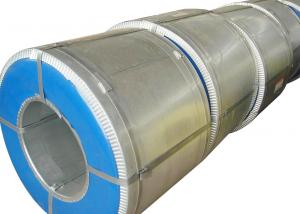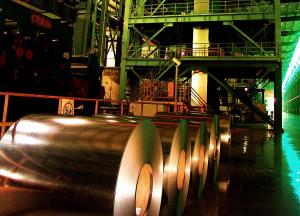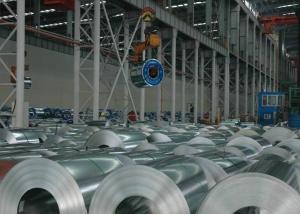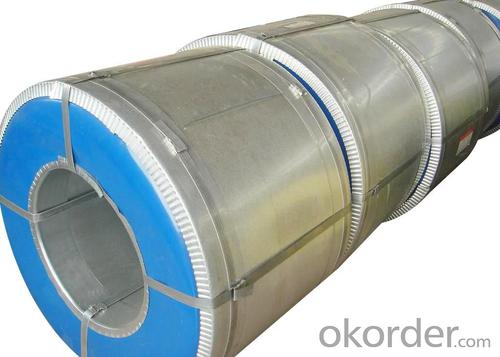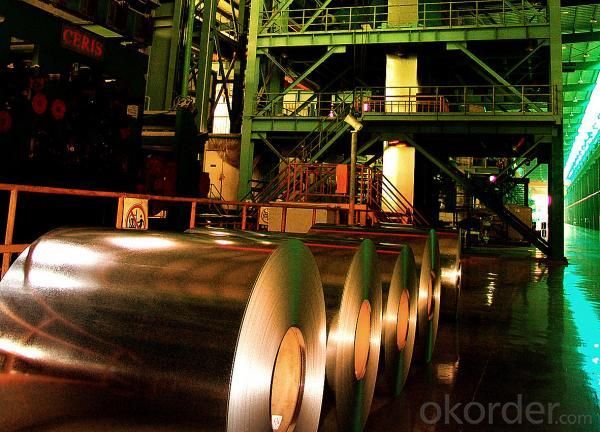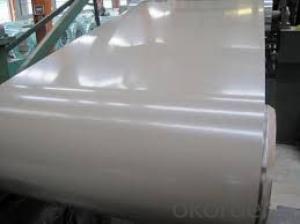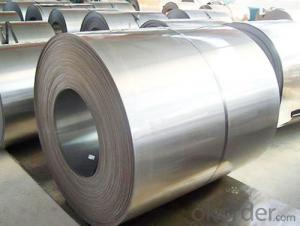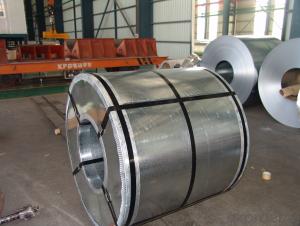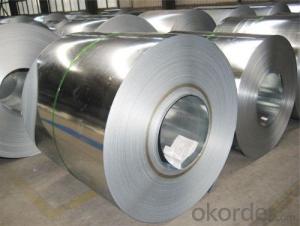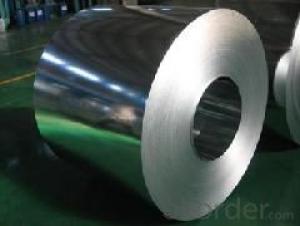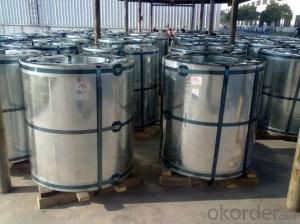Best Quality for Hot Dipped Galvanized Steel Coil
- Loading Port:
- China Main Port
- Payment Terms:
- TT or L/C
- Min Order Qty:
- 25 Metric Tons m.t.
- Supply Capability:
- 5000 Metric Tons per Month m.t./month
OKorder Service Pledge
OKorder Financial Service
You Might Also Like
General Information of Hot Dip Galvanized Steel Coil
Hot-dip galvanized steel coils are available with a pure zinc coating through the hot-dip galvanizing process. It offers the economy, strength and formability of steel combined with the corrosion resistance of zinc. The hot-dip process is the process by which steel gets coated in layers of zinc to protect against rust. It is especially useful for countless outdoor and industrial applications.
Specification of Hot Dip Galvanized Steel Coil
1. Thickness: 0.13mm-0.7mm
2. Width: 600mm-1250mm
3. Zinc Coating: 30-200g/m2
4. Internal Diameter: 508mm/610mm
5. Coil Weight: 3-12MT
6. Quality: commercial and structural quality
7. Surface Treatment: regular & minimum spangle, zero spangle, oiled & dry , chromated , non-skin pass ,skin pass
8. Standard: JIS G 3302, ASTM A 653M, EN 10327
9. Steel Grade: SGCC, CS, FS, SS, LFQ, DX51D+Z , S280GD
Technical Data of Hot Dip Galvanized Steel Coil
Chemical Composition | C | Si | Mn | P | S |
0.04-0.06% | 0.01-0.03% | 0.18-0.22% | 0.014-0.016% | 0.006%-0.009% |
Technical Data | |
Yield Strength | (Mpa) 280-320 |
Tensile Strength | (Mpa) 340-390 |
Elongation | 20%-30% |
Out-of-square | not exceed 1% Flatness |
Bow | 15mmmax |
Edge Wave | 9mmmax |
Centre Buckle | 8mmmax |
Bending At 180 Degree | No crack, purling and fraction |
Application of Hot Dip Galvanized Steel Coil
It can be widely used in transportation, light industry, civil usage and farming. It is also the perfect building material in construction for making roofing tile, steel profiles for wall partition, T-bar, studs, fireproof door, air conditioning duct and home appliance.
Package of Hot Dip Galvanized Steel Coil
Full wrapped with anti-damped paper inside, iron sheet wrapped outside, and bundled by iron strips
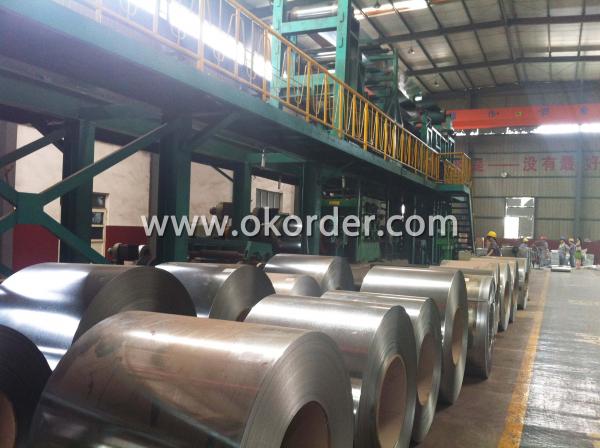
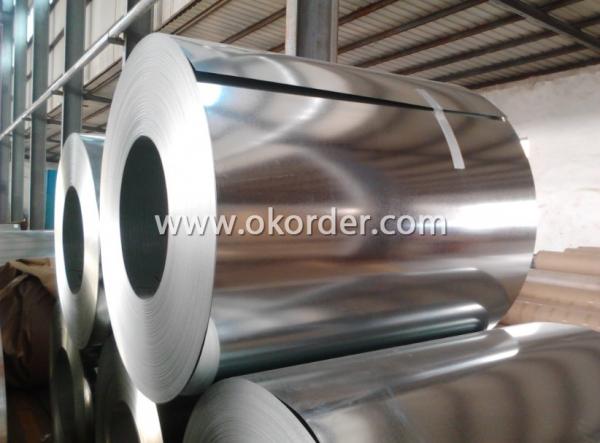
- Q: How are steel coils packaged for transportation?
- Steel coils are typically packaged for transportation using a variety of methods to ensure their safe and secure delivery. The packaging process involves several steps to protect the coils from damage during transit and to facilitate their handling and loading onto trucks, ships, or trains. Firstly, steel coils are tightly wound and bound using steel straps or bands to keep them compact and prevent unwinding. These straps are usually made of high-strength steel and are securely fastened around the circumference of the coil at regular intervals. This helps to maintain the coil's shape and prevent any movement during transportation. Next, the coils are often placed on wooden or steel pallets to provide a stable base and facilitate handling with forklifts or cranes. The pallets are usually sized to fit the dimensions of the coils and are designed to withstand the weight and stress of the loaded coils. To provide additional protection, steel coils are often covered with a layer of protective material such as plastic or paper to shield them from moisture, dust, and other potential contaminants. This wrapping also helps to prevent scratching or damage to the outer surface of the coils. Furthermore, to secure the coils and prevent shifting during transit, they are often placed within a steel or wooden crate. These crates provide an extra layer of protection and stability, particularly for larger coils or when multiple coils are being transported together. Finally, once the coils are properly packaged, they are typically loaded onto flatbed trucks, shipping containers, or railway cars for transportation. During loading, proper care is taken to ensure that the coils are positioned securely and that weight distribution is balanced to prevent any potential damage or accidents during transit. In summary, steel coils are packaged for transportation by tightly binding them with steel straps, placing them on pallets, covering them with protective material, and, if necessary, enclosing them within crates. This packaging process helps to safeguard the coils and ensure their safe and efficient transportation to their destination.
- Q: What are the common methods of testing the durability of steel coils?
- Common methods of testing the durability of steel coils include tension tests, impact tests, bending tests, hardness tests, and corrosion tests.
- Q: What are the different methods of testing steel coils for quality control?
- Steel coils undergo various methods for quality control testing to ensure they meet the necessary specifications and standards. These methods encompass visual inspection, dimensional measurement, hardness testing, tensile strength testing, chemical analysis, coating thickness measurement, surface roughness measurement, ultrasonic testing, and magnetic particle inspection. Visual inspection is the most fundamental technique, involving a thorough examination of the coils for surface defects like scratches, dents, or irregularities. This method enables the identification of visible defects in the material. Dimensional measurement, on the other hand, utilizes tools such as calipers, micrometers, or laser measuring devices to evaluate the dimensions of the steel coils. The measurements are compared against specified tolerances to ensure they meet the required standards. To assess the resistance of the steel coils to indentation or penetration, hardness testing is performed. This examination helps evaluate the material's strength and durability. Common hardness testing methods include Rockwell, Brinell, and Vickers hardness tests. Tensile strength testing measures the maximum tensile stress a steel coil can endure before breaking or deforming. This test helps determine the material's strength, elasticity, and compliance with the required specifications. Chemical analysis is crucial in testing the composition of the steel coils to verify the presence of specific elements in the desired amounts. This ensures that the coils are made from the correct grade of steel and comply with the required chemical composition standards. In cases where the steel coils have a protective coating, it is vital to measure the thickness of the coating. Non-destructive testing methods like magnetic induction or eddy current testing are typically employed for this purpose. The coating thickness is compared against the specified requirements to ensure it provides adequate protection. Surface roughness testing evaluates the smoothness or roughness of the steel coil's surface using instruments like profilometers or roughness testers. This testing method guarantees that the coils meet the required surface finish standards. Ultrasonic testing utilizes high-frequency sound waves to detect internal defects like cracks, voids, or inclusions within the steel coils. This non-destructive testing method provides valuable information about the structural integrity of the coil. Magnetic particle inspection is employed to identify surface and near-surface defects in steel coils. By applying magnetic particles to the surface and detecting any magnetic leakage caused by defects using magnetic sensors, this technique effectively detects cracks and other surface abnormalities. By combining these testing methods, manufacturers ensure that the steel coils produced meet the necessary quality standards and are suitable for their intended applications.
- Q: How are steel coils used in the manufacturing of automotive springs?
- Steel coils are used in the manufacturing of automotive springs as they provide the necessary strength and flexibility required to support the weight of the vehicle and absorb shocks and vibrations. The steel coils are shaped and tempered to specific dimensions and then coiled to form the springs, which are then installed in various parts of the vehicle's suspension system to ensure smooth and stable ride quality.
- Q: Also, what is the top best slow cooker that is 100% stainless steel? Thank you!
- You do not want 100% stainless steel cookware, because it's a poor conductor of heat. All high quality stainless cookware is layered with stainless steel only on the exterior and interior surfaces, while having at least an internal heat spreading core of aluminum or copper. Not all stainless steel is sufficiently ferrous (magnetic) to work with electric inductive cooktops, so some stainless cookware adds an additional layer of ferrous steel in addition to the thermal cores. You also wouldn't want a slow cooker that's 100% stainless steel, because the uneven heating would cause food to burn more quickly. They are usually made of ceramic stoneware for a reason, even heating. Besides, a stainless pressure cooker (with alum/copper) core can in less than an hour everything a slow cooker does in 3+ hours, with better flavor, color, and nutritional content. By the way, the Prestige stainless cookware isn't 100% stainless, of course, and that's a GOOD thing.
- Q: What are the quality standards for steel coil production?
- The quality standards for steel coil production typically include factors such as dimensional accuracy, surface finish, mechanical properties, chemical composition, and adherence to industry-specific standards and specifications. These standards ensure that the steel coils meet the required strength, durability, and performance criteria, and are suitable for various applications in industries like automotive, construction, and manufacturing.
- Q: How do steel coils contribute to the agricultural machinery industry?
- Steel coils are an essential component in the agricultural machinery industry due to their versatile and durable nature. They are used in various applications and play a crucial role in improving the efficiency and productivity of agricultural machinery. One of the primary ways steel coils contribute to the agricultural machinery industry is through their use in the manufacturing of equipment frames and structures. These frames provide the necessary strength and stability to withstand the demanding conditions of agricultural operations. Whether it is in tractors, harvesters, or tillers, steel coils are used to create sturdy and rigid frames that can handle heavy loads, vibrations, and impacts. Additionally, steel coils are used in the fabrication of components such as plow blades, cultivator tines, and seed drills. These components are crucial for soil preparation, seed planting, and crop maintenance. Steel coils provide the necessary strength and resistance to wear and tear, ensuring these components can withstand the rigors of agricultural operations and last for extended periods. Furthermore, steel coils are also used in the manufacturing of hydraulic systems and other moving parts in agricultural machinery. These systems are responsible for powering and controlling various functions, such as lifting, lowering, and steering. Steel coils provide the necessary strength and flexibility for these systems to function optimally, ensuring smooth and efficient operation of agricultural machinery. Moreover, steel coils contribute to the agricultural machinery industry by enhancing the safety and longevity of the equipment. Steel is known for its excellent resistance to corrosion, rust, and extreme weather conditions. By using steel coils in the construction of agricultural machinery, manufacturers can ensure that the equipment remains durable and reliable even in harsh environments, ultimately reducing maintenance costs and improving the overall lifespan of the machinery. In conclusion, steel coils are an indispensable component in the agricultural machinery industry. Their versatility, strength, and durability make them crucial for the manufacturing of equipment frames, components, hydraulic systems, and other moving parts. By utilizing steel coils, the agricultural machinery industry can produce robust and efficient equipment that can withstand demanding agricultural operations, improve productivity, enhance safety, and extend the lifespan of the machinery.
- Q: How are steel coils tested for tensile strength?
- Steel coils are typically tested for tensile strength through a process called tension testing, where a sample of the coil is pulled until it breaks. This test measures the maximum amount of force the steel can withstand without breaking, helping to determine its tensile strength.
- Q: How are steel coils processed for galvanizing or coating?
- Steel coils are processed for galvanizing or coating through a series of steps. First, the coils are cleaned to remove any dirt, grease, or other contaminants. Then, they are dipped into a bath of molten zinc or coated with a protective layer using various methods such as electroplating or hot-dip coating. After the coating process, the coils may undergo further treatments like drying, cooling, and leveling to ensure uniformity and quality.
- Q: The knife will be large and thick. Like the Bowie knife Rambo uses in Rambo III. It doesn't need to be flexible or to hold the edge very well. But i need it to be exceptionally strong material and to stop corrosion at least decently. Is Damascus Steel good?Thank you, in advance.
- If it does not could desire to hold an part o.k. then 440 stainless could be your appropriate guess. I want severe carbon steel. yet they require alot of cleansing and oiling or they're going to rust.
1. Manufacturer Overview
| Location | Shandong, China |
| Year Established | 2010 |
| Annual Output Value | |
| Main Markets | 33.03% Southeast Asia 33.03% South America 20.18% Africa 13.76% Mid East |
| Company Certifications | ISO9001:2008 |
2. Manufacturer Certificates
| a) Certification Name | |
| Range | |
| Reference | |
| Validity Period |
3. Manufacturer Capability
| a) Trade Capacity | |
| Nearest Port | Tianjin Port, China |
| Export Percentage | 61% - 70% |
| No.of Employees in Trade Department | Above 100 People |
| Language Spoken: | Chinese, English |
| b) Factory Information | |
| Factory Size: | 10,000-30,000 square meters |
| No. of Production Lines | 10 |
| Contract Manufacturing | OEM Service Offered |
| Product Price Range | Low |
Send your message to us
Best Quality for Hot Dipped Galvanized Steel Coil
- Loading Port:
- China Main Port
- Payment Terms:
- TT or L/C
- Min Order Qty:
- 25 Metric Tons m.t.
- Supply Capability:
- 5000 Metric Tons per Month m.t./month
OKorder Service Pledge
OKorder Financial Service
Similar products
Hot products
Hot Searches
Related keywords
